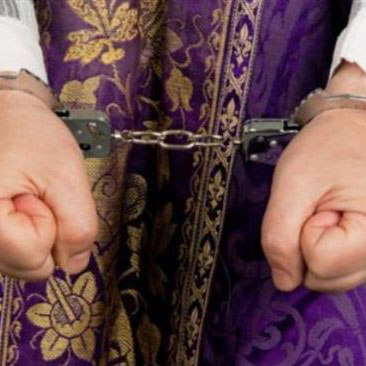Sometimes, when I read or hear about the sexual abuse of children by Catholic clergy, I am filled with righteous anger. Anger at the priests and religious who did this, and maybe even more so, anger at the bishops and others who covered up and enabled heinous evil. It’s hypocritical, and it’s disgusting.
But at other times, I am filled with anger at the media and critics of the Church. There are times — and this past week, with its malicious attack on Cardinal Pell is a good example — when public figures and commentators indulge in vicious anti-Catholic bigotry. The noble goals of truth, justice and healing are sacrificed, even if momentarily. But worse than that: the terrible trauma of victims and survivors is exploited. It’s hypocritical, and it’s disgusting.
But here’s the thing: while I periodically navigate between these extremes, I can find myself irrationally reacting against a media article I’m reading, or a person I’m engaging in conversation. Let me give you a few examples:
- In private conversation, a Catholic from an older generation decries the media obsession, and the slavish position of the Truth, Justice and Healing Council. I feel anger boiling up within me, and a dismay that the Church doesn’t whole-heartedly and without qualification accuse herself and engage in radical penance.
- I read a newspaper article which unjustly pillories individuals within the Church, and reduces the scourge of clergy abuse to something marginal, like celibacy for the Kingdom. I feel anger boiling up within me, and a stubborn defensiveness of the Church.
These are just two examples from a spectrum that covers every position and every reaction. But there’s a common denominator: I respond with self-righteous anger, which is quite different from righteous anger. Maybe you experience something like this yourself.
Because of this, I now studiously avoid second- and third-hand accounts of the Royal Commission and the cases of abuse. I still open myself up to first-hand accounts. The direct testimony of Royal Commission witnesses for example, and confidential conversations with victims and survivors of sexual abuse. In those instances I am moved by compassion, not self-righteous anger.
But I avoid TV and newspaper coverage, facile musical parodies, and even artful treatments (by all accounts) like Spotlight. These second- and third-hand accounts too easily stoke my passions in negative and destructive ways. Which tells me something I knew already: in the midst of this terrible sin and scandal, which teems with human vice and worldliness, the devil also prowls. There is something truly diabolical about all this, which we must attend to.
I repeatedly remind my parishioners, at the beginning of the media’s periodic coverage of the Church’s sins, to consciously foster a supernatural outlook:
- To match every minute consuming media treatment of this evil, with another minute prayerfully reading the life of Christ in the Gospels.
- To debrief with the Lord each evening, examining one’s emotional responses to the latest news or commentary, and placing it all in God’s hands.
- To choose one’s words carefully, and listen with real compassion when others speak about these matters.
Finally, and perhaps most importantly, I counsel visits to the Blessed Sacrament. To go out of one’s way and kneel before a tabernacle, even if only for a minute, to remind oneself that Christ is the head of the Church; he is the reason we are Catholic; and he is always present to us in the Eucharist, regardless of the virtue or vice of his ministers. When we do these things, I think, we are better able to respond to this terrible evil just as our Lord responds. Not with self-righteousness, but with real compassion, sorrow, and righteous anger.
One more thing: suffering is not in vain. Suffering can be redemptive. As St Paul so beautifully puts it,
“the Sinless One became sin, so that in him we might become the goodness of God.”
What is true of Christ is also true of the Church, and it’s true of us individually too, Christ’s members. We can assume sin, and carry its consequences within us, for the good and healing of others. So we should meet this current affliction with sincere hope in healing and redemption. For the Passion leads to the glory of the Resurrection.






Thanks for this helpful observation.
An extremely helpful, poignant and practical response to the horrific situation the Church finds itself in. I too often times yield to the temptation to indulge in self-righteous anger which ultimately yields nothing but bitterness and hopelessness. Instead, as you counsel us, we should seriously undergo deep reflection in prayer so as to approach these matters in a Christ like Spirit. Shared anger, shame and collective guilt are indeed powerful emotions that can be ruinously destructive; yet, at the same time, they can be portals to Redemption. Let us take advantage of this Lenten season to engage in such deep reflection, and pray for all affected by these horrendous crimes so that we may arise with Christ and experience hope for the future.
Yes the sins of our priests is a shame, yet we hear very little of other denominations sins from clergy and theirs is as great.
Let Him who is without Sin,cast the first Stone
An all to common to response that seems to be used all to easily and maybe not used in a correct context.
I agree that the media is hugely responsible for attacks on the Church, and although I vaguely take much notice of what is printed in Tabloids and associated networks on TV, the Royal Commission footage and Testimonies where horrific from Survivors who suffered horrific abuse as Children.
I myself was beyond disappointed at Clergy’s response and their failure to recall key moments, conversations that was all to common throughout in the inquest. Cowards to say the least. (Yet excuses will continue to be made for them.)
The honest truth is that the Church does have many Priests/Religious who lead by words and not actions and as a Parishioner, I am disillusioned with the real lack of Empathy.
The Church’s response has been Poor, shameful, and embarrassing.
I definitely condem the actions of some clergy but the media put so much emphasis on the Catholic Church, there are so many pedophiles in all walks of life; teachers, counsellors, judges, politicians….you name it…..but no…….the blame is on the Catholic….very sad….let us pray for our Church………that NEVER again this cruel sin will flourish………..
Thank you for your reflection and wise words Fr John, and for your timely reminder to balance what we read and hear with more prayer and Adoration.
Well said Father, thank you for this reflection.
Let him who without Sin ,cast the first stone…
Thank you, Fr John for these wise words.
Each and every priest is suffering because of this evil committed by a very few. We are confronted by a great mystery and I believe our response must be to pray for our priests and try and have some insight into the many difficulties they face today.
I recall about 15 years ago, when the scandals started re-cycling in the media, a priest standing before a congregation, his eyes full of deep misery. He said, “What hope do we have of attracting vocations? People hate us. They abuse us in the street.”
But you and other good young priests express God’s mercy and His control of events. I can’t wait for you and your contemporaries to take charge of the switchpoints.
I thought the Murdoch group were defenders of Cn Pell but now they seem to have turned on him, in a quite unexpected way.
I am very grateful to the media who we have to thank for exposing these clerical crimes. If it was not for the media and “Broken Rites’ nothing would have been done.
I recommend people view the live streaming of the Royal Commission or read the transcripts to get a picture of what has happened in Australia….and it’s not good.
Its possible to copy the transcripts, using cutting and pasting into your own computer docs – copy the pdf not the micro word doc on the site. One just goes to ‘case studies’, bottom left of main Royal Comm page, then scroll down to whichever you want. The Ballarat one is a fair way down, cos it started May 2015 with its phase one. I am on Day two of May 2015, phase one and I have to say, its a pretty horrendous journey but a practical way to honour the very numerous victims. I do think that studying the transcripts is the only way to be fully informed.
And the submissions are all there to read too, the raw data. That’s what the commissioners would have read prior to writing up their questions.
I guess this priest has some good points, like a philosopher, he’s sharing his thoughts on how to find the truth, sift through it and contemplate what action you might take next.
My action will be to lobby the relevant M.P’s to:
Change Legislation to make mandatory reporting compulsory for all people working with children anywhere in Australia.
For all the places where children are in the care of anyone other than their parents – there must be an agreed procedure for recording and reporting those things that are covered by mandatory reporting guidelines for teachers etc.
Using a very broad definition of working.
Yes! In the state of Victoria, all adults are now legally obliged to inform the police if they have a reasonable belief that child abuse is occurring.
Good afternoon . May I ask you if Harold Pacey is or was related to you.
Harold was born in England and died in NZ
Dear Father John, I read this article and can certainly identify with what you have written and can be totally honest in saying I was feeling the same. How you have written this article has helped me enormously to see the truth of my own reaction to what has been portrayed in the media especially against Cardinal George Pell. It has helped me to see exactly why I have reacted but more importantly what I can do to rectify my self-righteous anger. I am very grateful for this article and will watch less tv and pray for the victims and on Monday I will be certainly praying for Cardinal George Pell and the members of the Royal Commission
We have wondered if the reason Murdoch press have turned on Cn Pell, is that the high ups have decided CN Pell may not come out of the Ballarat Phase three examination at all well – this could then reflect adversely on Murdoch Group, should they be seen to be allied with Cn Pell. I do distinctly recall reading that Dame Elisabeth Murdoch, doyenne of Victorian gardening, was very disappointed with certain aspects of the London operations, eg. the Sun, London and its general tone. Anyrate, its not hard to surmise much of it has to do with money and the making of it. Sullying oneself with press-readings, yes – but it will be interesting to see how the press treats Cn Pell, in phase three Ballarat reportage.
Thank you Father for this. I have been very discouraged but your words remind me to look to Christ theAuthor and Finisher of our Faith.
Very good points, Father. The scandal makes me angry too, but sometimes I think it might be partly at least for selfish reasons. The scandal didn’t really affect me a great deal until Mum told me how one of Gerald Ridsdale’s victims committed suicide. Mind you, she only seemed to tell me that story to justify what seemed to me to be her descent from church teaching, which seemed to me to be the same as disobeying one’s parents and teachers which I was certainly never allowed to do. I won’t go into too much detail because I hardly wish to make Mum and Dad seem worse than they are.